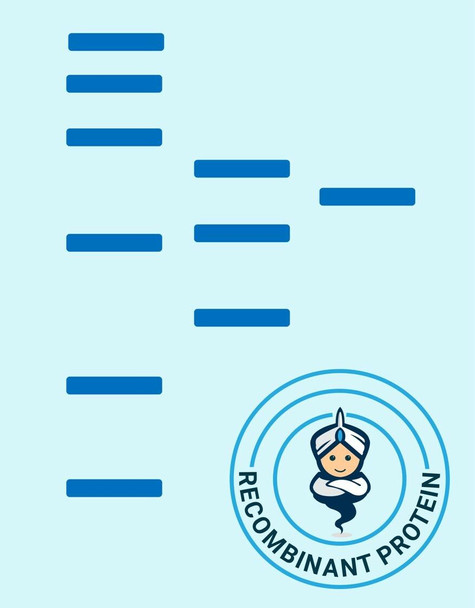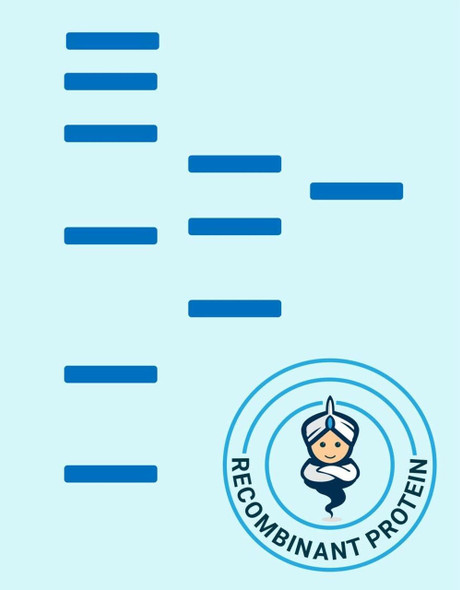Enzymes Recombinant Proteins
Human AK2 Recombinant Protein (RPPB2429)
- SKU:
- RPPB2429
- Product Type:
- Recombinant Protein
- Species:
- Human
- Uniprot:
- P54819
- Research Area:
- Enzymes
Description
| Product Name: | Human AK2 Recombinant Protein |
| Product Code: | RPPB2429 |
| Size: | 10µg |
| Species: | Human |
| Target: | AK2 |
| Synonyms: | ADK2, AK-2, Adenylate kinase isoenzyme 2 mitochondrial, ATP-AMP transphosphorylase 2, adenylate kinase 2. |
| Source: | Escherichia Coli |
| Physical Appearance: | Sterile filtered colorless solution. |
| Formulation: | AK2 solution containing 20mM Tris pH-7.5, 5mM DTT and 20% glycerol. |
| Stability: | AK2 Human Recombinant although stable at 4°C for 1 week, should be stored below -18°C. Please prevent freeze thaw cycles. |
| Purity: | Greater than 95.0% as determined by SDS-PAGE. |
| Amino Acid Sequence: | MGSSHHHHHH SSGLVPRGSH MAPSVPAAEP EYPKGIRAVL LGPPGAGKGTQAPRLAENFC VCHLATGDML RAMVASGSEL GKKLKATMDA GKLVSDEMVV ELIEKNLETP LCKNGFLLDG FPRTVRQAEM LDDLMEKRKE KLDSVIEFSIPDSLLIRRIT GRLIHPKSGR SYHEEFNPPK EPMKDDITGE PLIRRSDDNE KALKIRLQAY HTQTTPLIEY YRKRGIHSAI DASQTPDVVF ASILAAFSKA TCKDLVMFI |
| Biological Activity: | Specific activity: > 1.5 units/ml. One unit will convert 2.0 umoles of ADP to ATP + AMP per minute at pH 7.5 at 25C. |
Adenylate kinases play a role in regulating the adenine nucleotide composition within a cell by catalyzing the reversible transfer of phosphate groups among adenine nucleotides. There are 3 types of adenylate kinase isozymes, AK1, AK2, and AK3 in vertebrates. Expression of these isozymes are tissue-specific and developmentally regulated. AK2 is localized in the mitochondrial intermembrane space and is involved in apoptosis. AK2 is mutated in individuals with reticular dysgenesis.
AK2 Human Recombinant produced in E.Coli is a single, non-glycosylated, polypeptide chain containing 259 amino acids and having a molecular mass of 28.6 kDa. AK2 is fused to 20 a.a. His-Tag at N-terminus and purified by proprietary chromatographic techniques.
| UniProt Protein Function: | AK2: Catalyzes the reversible transfer of the terminal phosphate group between ATP and AMP. This small ubiquitous enzyme involved in energy metabolism and nucleotide synthesis that is essential for maintenance and cell growth. Plays a key role in hematopoiesis. Defects in AK2 are the cause of reticular dysgenesis (RDYS); also known as aleukocytosis. RDYS is the most severe form of inborn severe combined immunodeficiencies (SCID) and is characterized by absence of granulocytes and almost complete deficiency of lymphocytes in peripheral blood, hypoplasia of the thymus and secondary lymphoid organs, and lack of innate and adaptive humoral and cellular immune functions, leading to fatal septicemia within days after birth. In bone marrow of individuals with reticular dysgenesis, myeloid differentiation is blocked at the promyelocytic stage, whereas erythro- and megakaryocytic maturation is generally normal.In addition, affected newborns have bilateral sensorineural deafness. Defects may be due to its absence in leukocytes and inner ear, in which its absence can not be compensated by AK1. Belongs to the adenylate kinase family. AK2 subfamily. 6 isoforms of the human protein are produced by alternative splicing. |
| UniProt Protein Details: | Protein type:Mitochondrial; Nucleotide Metabolism - purine; EC 2.7.4.3; Kinase, other Chromosomal Location of Human Ortholog: 1p34 Cellular Component: mitochondrial inner membrane; mitochondrial intermembrane space; cytosol Molecular Function:adenylate kinase activity; ATP binding Biological Process: dATP metabolic process; nucleobase, nucleoside and nucleotide interconversion; nucleobase, nucleoside and nucleotide metabolic process; ADP biosynthetic process; brain development; liver development; AMP metabolic process; oxidative phosphorylation; nucleotide phosphorylation Disease: Reticular Dysgenesis |
| NCBI Summary: | Adenylate kinases are involved in regulating the adenine nucleotide composition within a cell by catalyzing the reversible transfer of phosphate groups among adenine nucleotides. Three isozymes of adenylate kinase, namely 1, 2, and 3, have been identified in vertebrates; this gene encodes isozyme 2. Expression of these isozymes is tissue-specific and developmentally regulated. Isozyme 2 is localized in the mitochondrial intermembrane space and may play a role in apoptosis. Mutations in this gene are the cause of reticular dysgenesis. Alternate splicing results in multiple transcript variants. Pseudogenes of this gene are found on chromosomes 1 and 2.[provided by RefSeq, Nov 2010] |
| UniProt Code: | P54819 |
| NCBI GenInfo Identifier: | 1708596 |
| NCBI Gene ID: | 204 |
| NCBI Accession: | P54819.2 |
| UniProt Secondary Accession: | P54819,Q16856, Q5EB54, Q5TIF7, Q8TCY2, Q8TCY3, A8K6L1 B4DHH7, B4DL64, |
| UniProt Related Accession: | P54819 |
| Molecular Weight: | 21,767 Da |
| NCBI Full Name: | Adenylate kinase 2, mitochondrial |
| NCBI Synonym Full Names: | adenylate kinase 2 |
| NCBI Official Symbol: | AK2�� |
| NCBI Official Synonym Symbols: | ADK2; AK 2�� |
| NCBI Protein Information: | adenylate kinase 2, mitochondrial; ATP:AMP phosphotransferase; ATP-AMP transphosphorylase 2; adenylate monophosphate kinase; adenylate kinase isoenzyme 2, mitochondrial |
| UniProt Protein Name: | Adenylate kinase 2, mitochondrial |
| UniProt Synonym Protein Names: | ATP-AMP transphosphorylase 2; ATP:AMP phosphotransferase; Adenylate monophosphate kinaseCleaved into the following chain:Adenylate kinase 2, mitochondrial, N-terminally processed |
| UniProt Gene Name: | AK2�� |
| UniProt Entry Name: | KAD2_HUMAN |






